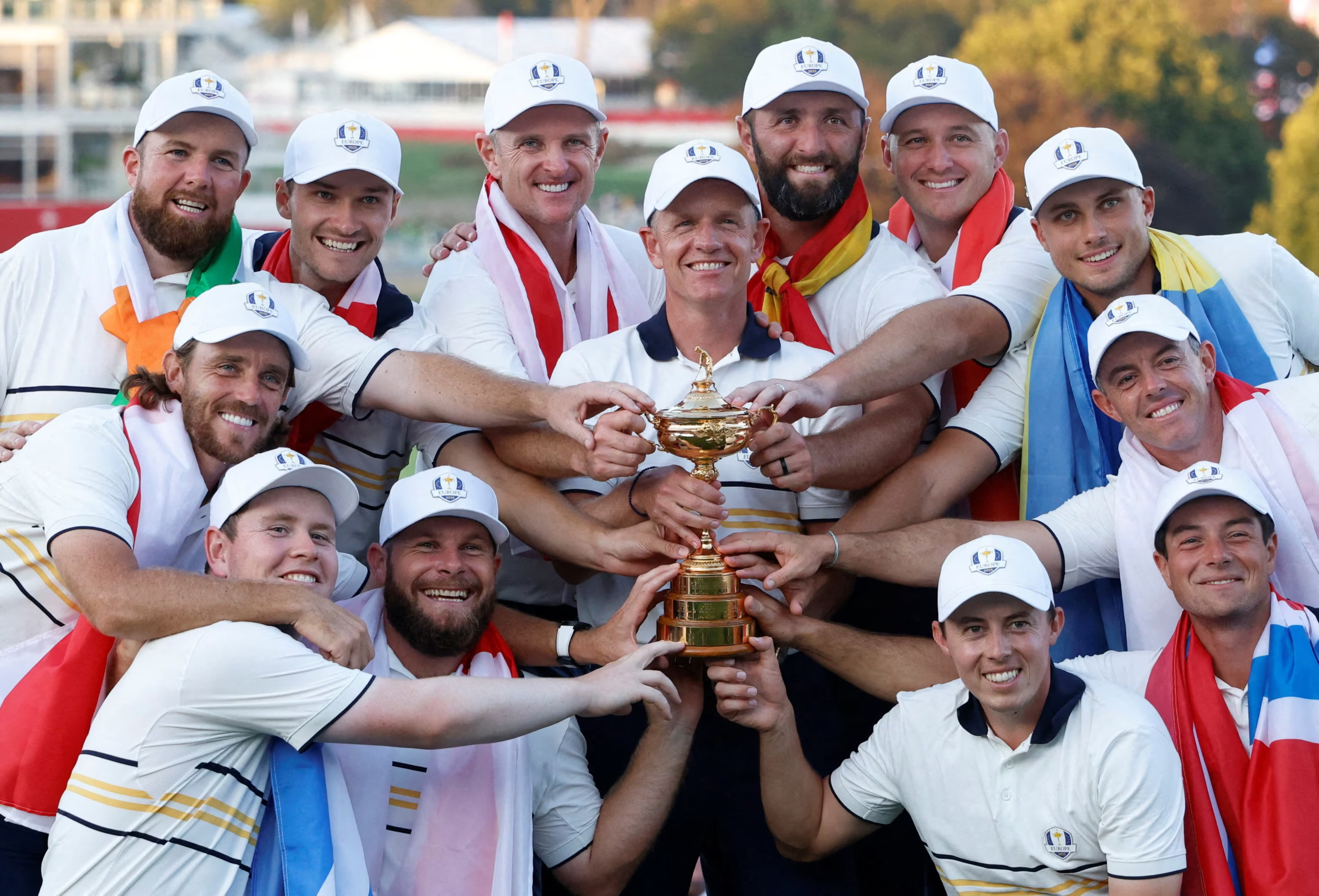In a stirring, often fraught battle on Long Island, Team Europe clinched a 15-13 victory over the United States at Bethpage Black — their first triumph on U.S. soil since 2012. The win not only preserves Europe’s hold on the Ryder Cup — having won in Rome two years ago — but also signals a shift in momentum and confidence, proving that golf’s most storied team event no longer belongs exclusively to the home side.
The story of 2025’s Ryder Cup is one of highs and lows, of arrogance challenged, of nerves tested, and of tight margins decided under pressure. Europe entered the final day holding a commanding cushion. But the Americans mounted a fierce resurrection that threatened to overturn the result — only for Irishman Shane Lowry to drain a clutch birdie for a half-point that sealed Europe’s fate. Along the way, controversy swirled over fan behavior, captaincy decisions, and the gritty fortitude of individual players. This is how it all unfolded.
Dominance Early, a Cushion Built
A Start That Stunned the Hosts
From the first foursomes and four-ball sessions, Europe made their intentions clear. They swept the opening session and refused to relent. By Saturday evening, Europe held an imposing 11½ to 4½ lead — the largest cushion ever attained by a visiting team heading into singles play.
The Europeans’ method was simple yet effective: relentless pressure, sharp shotmaking, and a psychological edge that seemed to grow with each half or full point secured. Their pairs combinations — notably McIlroy/Fleetwood and Rahm/Hatton — delivered, often thwarting U.S. comeback attempts.
Key Moments That Defined the Lead
- In the foursomes matches, McIlroy and Fleetwood dismantled English/Morikawa with a 3&2 result, continuing a dominant run.
- Rahm and Hatton matched that performance, defeating Cantlay and Schauffele, extending their partnership’s winning legacy.
- Viktor Hovland and Robert MacIntyre took their match down to the wire, winning 1 UP over Russell Henley and Scottie Scheffler — a result that padded Europe’s margin further.
By Saturday’s close, the stage was set: the Americans faced a gargantuan task to overcome a seven-point gap in the singles.
The Sunday Surge: USA’s Fierce Rally
A Roar from the Home Crowd

Sunday’s singles began with hope renewed in the U.S. camp and the roar of the New York crowd rising to a fever pitch. The crowd, vocal and at times unruly, seemed galvanized by the underdog narrative. But some of that passion crossed lines: heckling, jeering, and abusive language directed at European players became a recurring complaint. Rory McIlroy, in particular, called out “unacceptable” behavior, urging higher standards in the sport.
Tom Watson, a revered American golfing icon, went as far as publicly apologizing for segments of the crowd’s conduct, saying he was “ashamed” of the rude and mean-spirited behavior. The atmosphere had grown toxic, and that tension only added to the pressure on players from both sides.
A Comeback That Nearly Sank Europe
Match after match, the Americans chipped away. Justin Thomas, Scottie Scheffler, Cameron Young — all found momentum. Bryson DeChambeau, in particular, staged a stirring recovery from several holes down to force a tie with Matt Fitzpatrick.
One by one, the U.S. closed the gap. Where Europe had felt comfortable, anxiety crept in. The scoreboard shrank rapidly, and what had loomed as a sure victory became a cliffhanger.
The Defining Blow: Lowry’s Birdie
At match number eight of the day, Shane Lowry of Europe squared off against Russell Henley. Needing a half point to guarantee at least a tie (and thereby retain the Ryder Cup), Lowry drained a 6½-foot birdie putt on the 18th hole. That stroke shifted Europe to 14 points, mathematically ensuring they would keep the Cup — regardless of remaining results.
Tyrrell Hatton, in another key match, halved with Collin Morikawa to push Europe beyond the 14½ threshold and seal the victory outright. In total, Europe’s final tally stood at 15 points, with the U.S. reaching 13.
The Human Stories: Heroes, Critics, and Legacy
Luke Donald’s Tactical Ascendancy
The architect behind Europe’s success was captain Luke Donald. With this win, Donald became just the second European skipper to lead his team to both home and away victories (joining Tony Jacklin). His choices in pairings, timing of substitutions, and motivational approach drew praise. Jon Rahm called his captaincy “absolutely astonishing” — a benchmark unlikely to be matched.
Donald himself admitted the final hours were among the most stressful of his life, acknowledging that golf’s razor edge can be merciless.
Shane Lowry: From Pressure to Legendary
Few moments will be more replayed in Ryder Cup lore than Lowry’s birdie on 18. A stoic presence over the week, he delivered when the eyes of the golfing world were on him. He later admitted to not envisioning himself in that role — yet he embraced it with composure.
Lowry’s emotional release after the putt — tears, laughter, and relief — captured the weight of the moment and the human drama at the heart of team golf.
U.S. Reflections: Missteps and What Could Have Been
For the American side, the loss was a bitter pill. Captain Keegan Bradley acknowledged in the aftermath that mistakes were made — in pairings, substitutions, and course strategy. Analysts were even harsher. A scathing piece titled “The cascading failures of a Bethpage U.S. Ryder Cup” called the American performance a rout in all but Sunday’s heroics. G
Scottie Scheffler’s 0–4 record drew particular criticism — the first player in decades to go winless in such format. The depth beyond the star names also appeared lacking; some U.S. personnel failed to deliver when needed most.
In addition, the controversial “envelope rule” — which awards a half-point to both sides in instances where a player withdraws before singles — came into play when Viktor Hovland withdrew with a neck injury. The resultant split point in that match contributed to Europe’s margin. Some American voices suggested that rule needs reform.
The Controversy of Crowd Conduct
If the golf itself was electric, the atmosphere off it was combustible. Reports of abusive language, taunts, and thrown objects toward European players marred the competitive integrity. Rory McIlroy spoke out strongly against the behavior, arguing that golf “should be held to a higher standard.”
Tom Watson’s public apology added weight to the criticism. The Ryder Cup, often celebrated for passion and rivalry, was forced to confront its darker edges in 2025.
In many corners, the take was that the U.S. lost more than golf — they lost decorum, respect, and image.

Aftershocks and Looking Ahead
This victory has profound implications. Europe breaking through on American soil disrupts a longstanding narrative: that the home side is all but invincible in the Ryder Cup. It signals that, even abroad, Europe can seize control.
Luke Donald’s future as a captain now draws intrigue. He’s left open the possibility of serving again in 2027 at Adare Manor (Ireland). Beyond that, Europe’s renewed belief, bolstered by clutch play and team cohesion, may set a new standard for future contests.
American Introspection
For the United States, 2025 will be a moment of introspection. Talent exists, but execution faltered. The format, substitutions, pairings, and leadership decisions will all be dissected. Will Tiger Woods or another high-profile figure assume the captaincy in 2027? Can the Americans reestablish home dominance? Those are questions now officially reopened.
The Next Chapters: 2027 and Beyond
The next Ryder Cup is already on the calendar: September 17–19, 2027, at Adare Manor in Ireland. Europe will enter as defending champions on home ground — a potent position. The U.S. will look to reclaim momentum, but Europe now holds both the Cup and psychological upper hand.
The 2025 Ryder Cup will be remembered not just for the result, but for its drama, tension, and symbolic resonance. Europe’s 15-13 win on U.S. soil defeated more than opponents — it challenged preconceptions, weathered hostilities, and seized opportunity under immense pressure. In golf’s grand theater, few victories will match its narrative power.
















